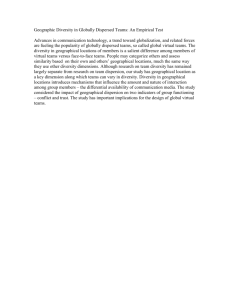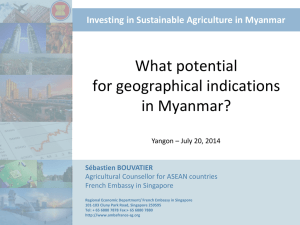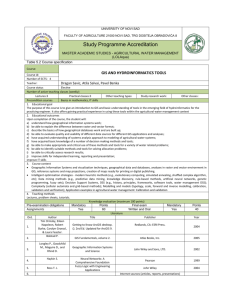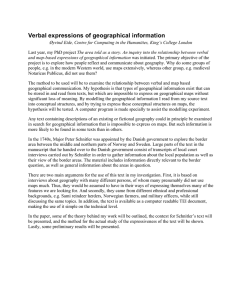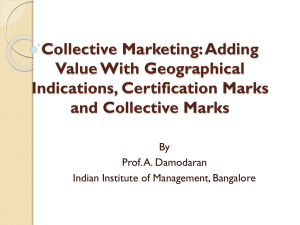Protection of Geographical Indications in India Creating Wealth Out of GIs
advertisement
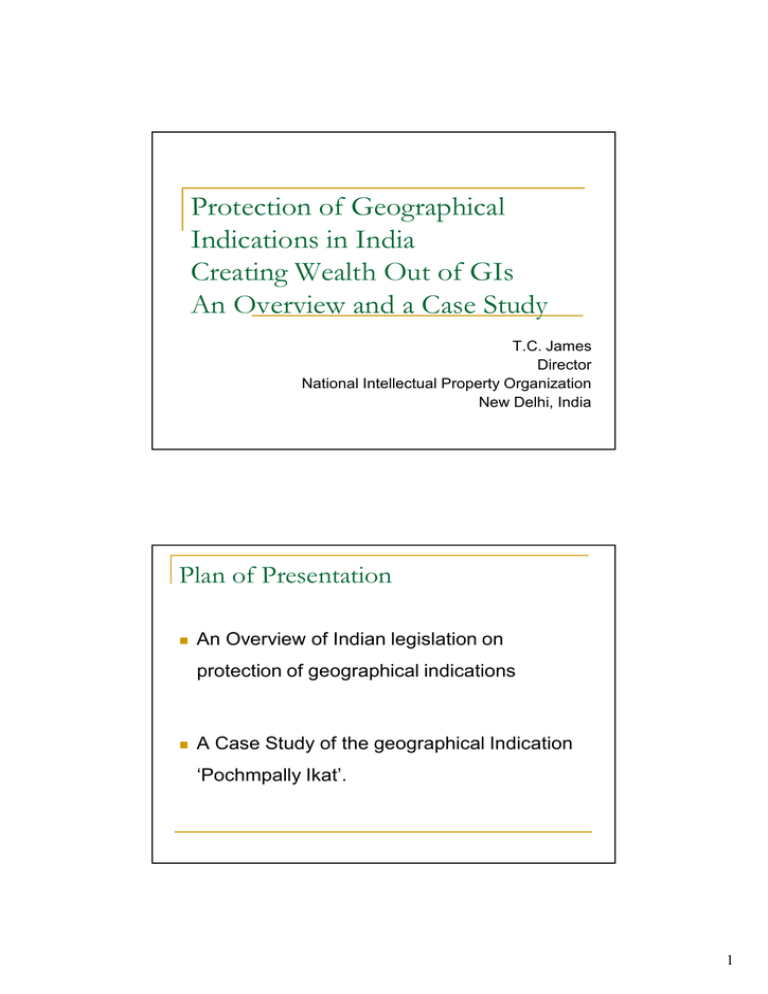
Protection of Geographical Indications in India Creating Wealth Out of GIs An Overview and a Case Study T.C. James Director National Intellectual Property Organization New Delhi, India Plan of Presentation An Overview of Indian legislation on protection of geographical indications A Case Study of the geographical Indication ‘Pochmpally Ikat’. 1 Law The Geographical Indications of Goods (Registration and Protection) Act, 1999 (48 of 1999) The Geographical Indications of Goods (Registration and Protection) Rules, 2002 (GSR 176 E) dt. 8.3.02 9 Chapters; 87 Sections 2 parts; 116 Rules; 3 schedules; 10 Forms. The Act was brought into force w.e.f. 15 September 2003. Salient Features of the Law Wide Definition of Goods Goods could be natural, agricultural or manufactured goods including goods of handicraft or industrial goods or foodstuff Geographical area could be a country, region or locality in the territory of a country Qualifiers could be quality, reputation or other characteristics which are essentially attributable to the geographical origin Explanation clarifies that GI need not be a geographical name. 2 Salient Features of the Law Registration Provides for registration of GIs, Proprietors & Authorized Users Any association of persons or producers or any organization/authority established by or under law which represents the interests of the producers of the concerned goods can move the application for registration GI Registry set up in Chennai Registration valid for 10 years; unrestricted renewals Registration prima facie evidence. Salient Features of the Law Procedure for Registration Filing of application before the Registrar Examination by Registry/Consultative Group Registrar either refuses or accepts subject to conditions Advertisement for opposition 3 months time for opposition If no opposition, registration In case of opposition, copy given to applicant 2 months for filing counter statement 3 Procedure for Registration contd. If no counter statement filed, then the application is deemed abandoned Copy of counter statement provided to the opponent Hearing of parties, if so desired Registrar can rely suo motu, on grounds of opposition not raised by opponent Registrar may add conditions or limitations Registration if no opposition or if opposition decided in favour of the applicant Issue of registration certificate. Salient Features of the Law Rights and Infringement Exclusive right to Use the GI on the goods and Obtain relief for infringement Use by any person not being an authorized user in such a manner which misleads as to the geographical origin of the goods or which constitutes an act of unfair competition including passing off is an infringement of the right Dealings in the lawfully acquired goods by the person who acquired the same and for processing/packaging of such goods are not infringement. 4 Salient Features of the Law Relief for Infringement Both civil and criminal remedies available Civil action for injunction, claim for damages or accounts and destruction of infringing labels Criminal remedies for falsification of a GI, falsely applying a GI to goods, selling goods to which false GIs have been applied and falsely representing a GI as registered A cognizable offence which a police officer not below the rank of DySP is entitled to search and seize goods, die, block, machine, plate, etc. after obtaining prior opinion of Registrar ‘on the facts involved’. Salient Feature of the Law Relief for Infringement Imprisonment for 6 months to 3 years plus fine Rs 50,000 (US $ 1200) to Rs. 200,000 ( US $ 4800) for first offence Enhanced penalty for second or subsequent conviction i.e., Imprisonment ranging from 1 year to 3 years plus fine Rs. 100,000 ($ 2400) to Rs. 200,000 ($ 4800) . 5 Current Status: Registered GIs Agricultural goods 31 Handicrafts 78 Spirits 01 Foodstuffs 02 Other manufactured goods 05 Total 117 POCHAMPALLY IKAT 6 Pochampally Ikat Pochampally is a small town in Andhra Pradesh, India known for its handloom fabric having unique traditional designs, Pochampally Ikat, from at least 1915 Special technology of tie-and-dye is used for making the designs Material is either cotton or silk or a combination of the two only. Preparing the yarn 7 Bleaching & Dyeing Preparing the thread for tie & dye 8 Tie and Dye Process Quality Inspection & Weaving preparatory process 9 Weaving Final Product 10 Uniqueness of Pochampally Ikat Having single, combined or double Ikat in several illustrations ranging from : The use of diamond or chowka Diagonal or square grids in which geometrical floral figurative motifs are woven Striped or chevron forms Other abstract variations The Problem and Action Taken Issue of misappropriation: manufacture and marketing of products with Pochampally name and design by large mills outside Pochampally using power looms: a heritage problem Livelihood Issue: Reduced market; low price of mill products Reduced Income for about 5000 handloom weavers Shrinking Employment Opportunities in the region; in one decade about 50 % weavers switched to other professions The Government, therefore, engaged an agency to study and find solution Confederation of Indian Industry and other organisations were associated Awareness seminars and workshops were organised 11 Modus Operandi Identifying the Uniqueness Financial Support Technical & Legal Support Drafting of the Specifications for IP applications Filing & Prosecution Solution Associations of weavers of Pochampally Ikat from the region were formed Associations obtained registration of various IP rights such as copyrights, trade marks, designs and geographical indications during 2004-2005 Greater stress on trade marks and geographical indications. 12 Immediate Benefits – Post GI Registration Media attention on Pochampally artisans –consumer awareness, increased popularity Motivation & morale boost for weavers – weavers became more responsive and serious – increase in productivity – emergence of a market discipline Networking and social cohesion among the weavers. Increased market penetration -- 20% increase in sales Orders through the Internet too. Website: www.pochampally.com Increased Investment Pochampally Handloom Park at a cost of Rs. 5000 million. What next for Pochampally Enforcement of the Geographical Indications for preventing copying & passing off – Action against counterfeiters and infringers Establishing the legal identity in the international market – Creation of brand image Setting up of mechanisms for quality control. 13 Conclusions Needs pro-active action by governments Identify products Facilitate club formation Assist in marketing NGOs can also contribute significantly Technical assistance programmes need to explore possibilities of products which qualify for GI tags and facilitate creation of IP value. Conclusions contd. Countries like India have more GIs in the manufactured goods These are in the SME and mostly rural sector Have potential to transform rural economy if properly exploited. Need extension of higher level of protection currently provided only to wines and spirits to all products If any multilateral register is to be established for GIs, then that should include all products and restricted to wines and spirits. 14 Thank you 15
